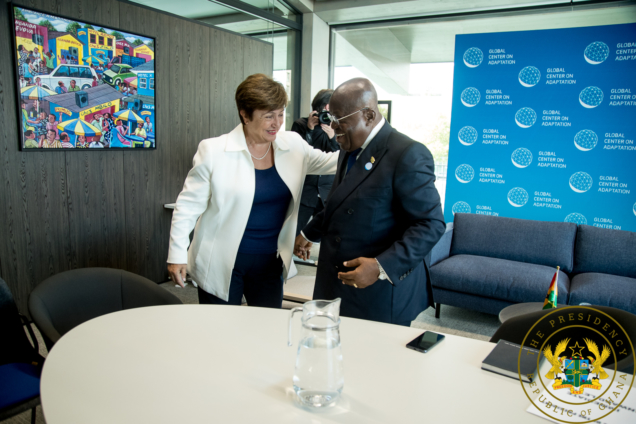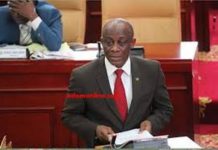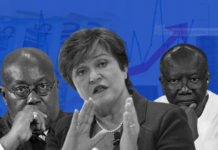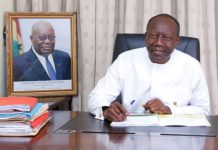
The International Monetary Fund (IMF) has approved the second tranche of US$600 million for Ghana.
This was contained in a statement issued by the IMF on Friday, January 19, 2024.
“The Executive Board of the International Monetary Fund (IMF) completed today the First review of the $3 billion, 36-month Extended Credit Facility (ECF) Arrangement, which was approved by the Board on May, 17, 2023 , as well as the 2023 Article IV Consultation with Ghana. The completion of the first ECF review allows for an immediate disbursement of SDR 451.4 million (about US$600 million), bringing Ghana’s total disbursements under the arrangement to about US$1.2 billion,” portions of the statement read.
Ghana recently concluded negotiations with its bilateral lenders, including China and France, marking a pivotal moment that facilitated the release of the second tranche.
This achievement signifies Ghana’s successful completion of the first review under the Fund program, following the initial tranche received in May last year.
The government has announced its intention to allocate the newly approved $600 million to support various activities outlined in the 2024 budget, reflecting a strategic approach to utilizing the funds for economic development.
In a noteworthy move, Ghana has secured a moratorium with its official creditors, deferring debt payments until May 2026.
Additionally, reports suggest that the country is on track to finalize an agreement with Eurobond investors for the restructuring of a $13 billion debt by the end of March.
Finance Minister Ken Ofori-Atta has shared plans to fulfill $5.4 billion in bilateral obligations through two installments over 16 and 17 years, demonstrating a commitment to managing debt responsibly.
Expressing optimism, the Finance Minister had previously highlighted the country’s expectation of securing funding from the International Monetary Fund (IMF) based on the financial assurance provided under the G20 Common Framework.
In a related development, the World Bank has signaled its readiness to extend $300 million in budgetary support to Ghana, aiming to contribute to the country’s economic recovery.
The World Bank’s Board of Executive Directors is scheduled to convene next week to release this financial support, following the Official Creditors’ Committee’s agreement in principle on the major criteria of Ghana’s planned debt restructuring.
This collective support from international financial institutions reflects a collaborative effort to bolster Ghana’s economic resilience and stability.
ALSO READ:
Below is the full press statement from the IMF
IMF Executive Board Concludes 2023 Article IV Consultation with Ghana and Completes First Review under the Extended Credit Facility Arrangement
The Executive Board of the International Monetary Fund (IMF) completed today the First review of the $3 billion, 36-month Extended Credit Facility (ECF) Arrangement, which was approved by the Board on May, 17, 2023 , as well as the 2023 Article IV Consultation with Ghana. The completion of the first ECF review allows for an immediate disbursement of SDR 451.4 million (about US$600 million), bringing Ghana’s total disbursements under the arrangement to about US$1.2 billion.
Ghana’s economic performance has been marked by significant volatility over the years. Episodes of strong growth and overall macroeconomic stability were undermined by rising inflation, exchange rate depreciation, and loss of external buffers, in turn largely reflecting overly accommodative fiscal policies. Most recently, severe external shocks compounded pre-existing fiscal and debt vulnerabilities, exacerbating such volatility and leading to acute economic and financial pressures in 2022.
The authorities’ reform program has been designed to respond to immediate pressures and pave the way for a more resilient and prosperous economy. The ECF arrangement has provided a framework to implement the authorities’ policy and reform strategy to restore macroeconomic stability and debt sustainability, address long standing vulnerabilities, and lay the foundations for higher and more inclusive growth.
Ghana’s performance under the program has been strong. All quantitative performance criteria for the first review and almost all indicative targets and structural benchmarks were met.
Consistent with the authorities’ commitments under the Fund-supported program, Ghana is on track to lower the fiscal primary deficit on a commitment basis by about 4 percentage points of GDP in 2023. Spending has remained within program limits. To help mitigate the impact of the crisis on the most vulnerable population, the authorities have significantly expanded social protection programs. On the revenue side, Ghana has met its non-oil revenue mobilization target.
The Ghanaian authorities are also making good progress on their debt restructuring strategy. Their domestic debt restructuring was completed over the summer. On January 12, 2024, the authorities reached an agreement with the Official Creditor Committee (OCC) under the G20’s Common Framework on a debt treatment that is in line with Fund program parameters. This agreement provided the financing assurances necessary for the Executive Board review to be completed.
Ambitious structural fiscal reforms are bolstering domestic revenues, improving spending efficiency, strengthening public financial and debt management, preserving financial sector stability, enhancing governance and transparency, and helping create an environment more conducive to private sector investment.
The authorities’ reform efforts are bearing fruit, and signs of economic stabilization are emerging. Growth in 2023 has proven resilient, inflation has declined, and the fiscal and external positions have improved.
Looking ahead, fully and durably restoring macroeconomic stability and debt sustainability and fostering a sustainable increase in economic growth and poverty reduction will require steadfast policy and reform implementation.
At the conclusion of the Executive Board’s discussion, Mr. Bo Li, Deputy Managing Director and Acting Chair, issued the following statement:
“Ghana’s economic performance has been marked by significant volatility over the years. Most recently, severe external shocks compounded pre existing fiscal and debt vulnerabilities, leading to acute economic and financial pressures in 2022.
The authorities’ efforts to reorient macroeconomic policies, restructure debt, and initiate wide ranging reforms are already generating positive results, with growth more resilient than initially envisaged, inflation declining, the fiscal and external positions improving, and international reserves increasing.
“Fully and durably restoring macroeconomic stability and debt sustainability and fostering higher and more inclusive growth require steadfast policy and reform implementation.
The government’s plans to further reduce deficits by mobilizing additional domestic revenue and streamlining expenditure and to finalize its comprehensive debt restructuring are critical to underpin debt sustainability and ease financing constraints.
Continued efforts to protect the vulnerable and to create space for higher social and development spending are also key. Reforms to improve tax administration, strengthen expenditure control and management of arrears, enhance fiscal rules and institutions, and improve SOEs management are needed to ensure lasting adjustment.
“The authorities took decisive steps to rein in inflation and rebuild foreign reserve buffers. Maintaining an appropriately tight monetary stance and enhancing exchange rate flexibility are key to achieving the program’s objectives.
“Bank of Ghana had deployed its regulatory and supervisory tools to mitigate the impact of the domestic debt restructuring on financial institutions. The authorities’ strategy aimed at maintaining a sound financial sector, drawing on new resources from the private sector, government, and multilaterals to rapidly rebuild financial buffers, is welcome. Ensuring full implementation of bank recapitalization plans and addressing legacy issues in the financial sector will be important.
“Reforms to create an environment more conducive to private investment are needed to enhance the economy’s potential and underpin sustainable job creation. Given Ghana’s exposure to climate shocks, promoting a green recovery by further advancing the adaptation and mitigation agendas should also remain a priority.”





